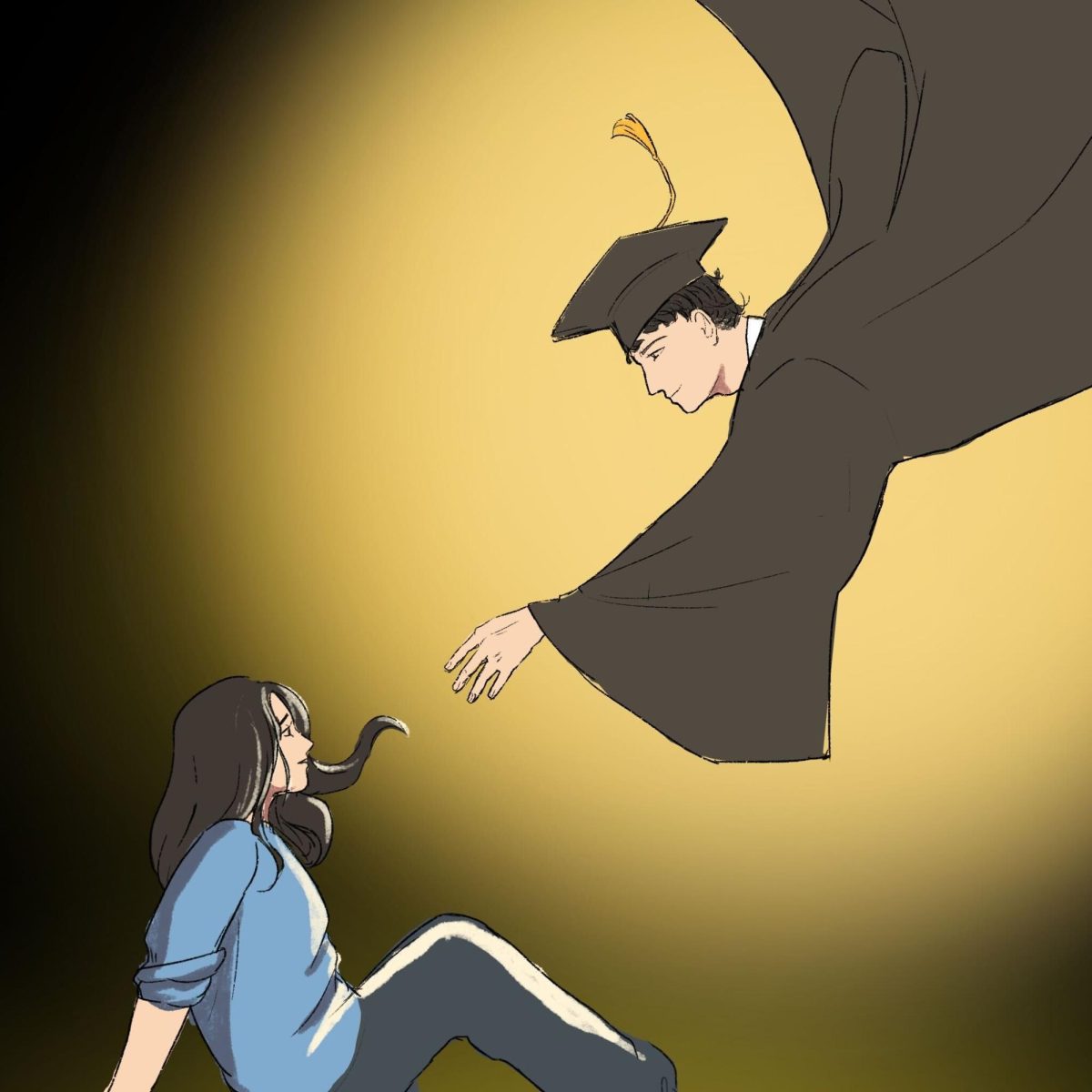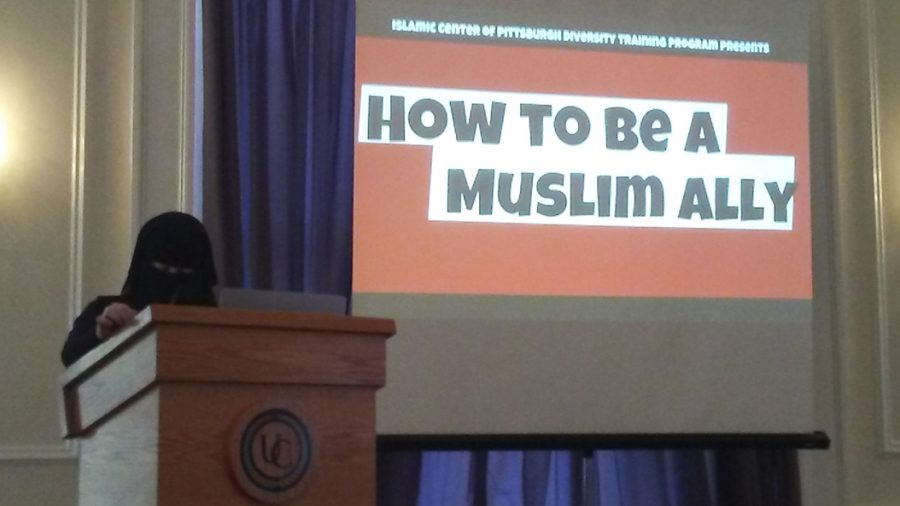How much do you really know about Islam?
That’s what Kelcey Sharkas, from the Islamic Center of Pittsburgh, tested a crowd of more than 50 people on when they gathered in a University Club ballroom Wednesday afternoon.
On a handout, she posed 20 true-or-false statements to students including, “Jesus is mentioned in the Holy Quran 25 times,” “The word ‘Islam’ comes from the the root word for ‘peace’” and “The word ‘jihad’ translates to mean ‘holy war’ against all non-Muslims.”
After reading off whether each statement was true or false — Jesus is mentioned 25 times, Islam does come from “peace,” though jihad actually translates to mean spiritual struggle, usually an internal one — Sharkas asked if anyone had gotten all of the questions correct.
People looked around the room to see if any hands were raised. There were none.
“[Muslims] don’t expect you to know everything,” Sharkas, the director of programming and outreach coordinator, said. “We don’t expect that, but we expect you to open your mind to re-learn the things you might have misunderstandings about.”
In her presentation, “How to be a Muslim ally,” Sharkas went over the basics of Islam and debunked misconceptions about the religion. In addition to the true-or-false sheet, everyone who attended the lecture picked up the ICP’s “How to be a Muslim ally: A step-by-step guide,” which included a vocabulary sheet of common Muslim phrases, a brief summary of the five pillars of Islam and a list of eight ways to be an active ally.
“This is a society surrounded by fear right now,” Sharkas said. “And that’s why showing solidarity, reaching out to people, saying ‘I’m not afraid of you, I understand that you’re good and you don’t deserve to be discriminated against,’ can do so much good.”
In an attempt to engage the community and promote understanding, the ICP has hosted several other educational or recreational events in the last year, including community dinners held at mosques around the city. Today’s lecture was the fifth “How to be a Muslim ally” lecture given in the city since March, and the ICP will also be starting a free Islam 101 course soon, Sharkas said.
Sharkas’ talk was part of the Dietrich Arts and Sciences Open Door Project, based on creating a more welcoming environment for students and faculty.
Carol Mullen, the director of communications for Arts and Sciences, said the lecture was another way to celebrate diversity during Pitt’s self-dubbed “Year of Diversity.”
“The University of Pittsburgh is a very large community, and we are strengthened by our differences,” Mullen said. “It feels like this is a meaningful way to do that. It’s a way to provide visibility and really welcome people.”
Mullen said while Open Doors aligns with the Year of Diversity, the plan is to continue it beyond this year.
At the beginning of the lecture, Sharkas touched on the first phrase listed on the “Common Muslim Jargon Vocabulary Sheet” –– As-salamu alaykum, which means “peace be upon you.” Sharkas said non-Muslims can use the phrase, a common greeting, as “an easy way to show solidarity.”
“This brings a sense to a Muslim not only is this person friendly, but this person might understand something more about Islam and not have all those misconceptions, so I can feel comforted,” Sharkas said. “This person is a friend of mine.”
Sharkas focused heavily on the idea that “Islam oppresses women and forces them into a subservient role.” She noted a verse in the Quran in which the prophet Muhammad says there are two reasons for women to cover in the Islamic faith: identity and “to not to be bothered or abused.”
To drive in the point, Sharkas recounted an experience from her time working in retail when a man was harassing fellow female employees. She told the women to wait in the back until he left, while she stayed up front. The man didn’t approach Sharkas at all.
“For me as a woman, that was empowering,” Sharkas said. “I was like, ‘This is me forcing you to respect me and to not objectify me in society’ … When I wear the niqab, it forces people [to make] eye contact. It’s the idea of ‘see me for me.’”
Sharkas also said while she wouldn’t deny there are Muslim-majority nations who oppress women, it is part of Islam to “stand up against that,” and covering is a choice for Muslim women.
“Our intentions are supposed to be purely for God,” Sharkas said about Islam. “And so, all of a sudden, if I become Muslim, if I pray, if I’m giving charity or if I’m wearing a headscarf because my father told me, because my husband told me, because my country told me –– I’m no longer doing it for God. I’m doing it for those other people.”
Among the other misconceptions or identifications Sharkas addressed was the idea that Muslims are bent on converting others to the faith, as well as quotes from the Quran that she said have been taken out of context.
Katie McGovern, a junior communication science and disorders major, attended the lecture as part of the Introduction to Gender, Sexuality and Women’s Studies class she is currently taking. McGovern said Sharkas seemed “super knowledgeable.”
“She really just sheds light on the stereotypes [about Muslims],” McGovern said. “Often, people want to be allies, but they don’t know how, so it’s good to inform yourself to be an authentic ally.”
Before doing a brief Q&A after the lecture, Sharkas outlined ways non-Muslims can be active allies: listening, being an active voice on social media, speaking out against anti-Muslim sentiment and continuously learning more about Islam.
Sharkas, who has been giving lectures about Islam with the ICP for about two years, said she understands that a lot of the attendees were probably already interested in opening their minds to other religions or cultures. But, she added, the more information people have, the better.
“I think the people who come to an event like this want to show solidarity or already see the cause as positive,” Sharkas said. “The people who came become the spokespeople to other outlets who have misconceptions [about Islam].”
How to Be a Muslim Ally by Alexa Bakalarski on Scribd
The guide is courtesy of Carol Mullen and the Islamic Center of Pittsburgh.



